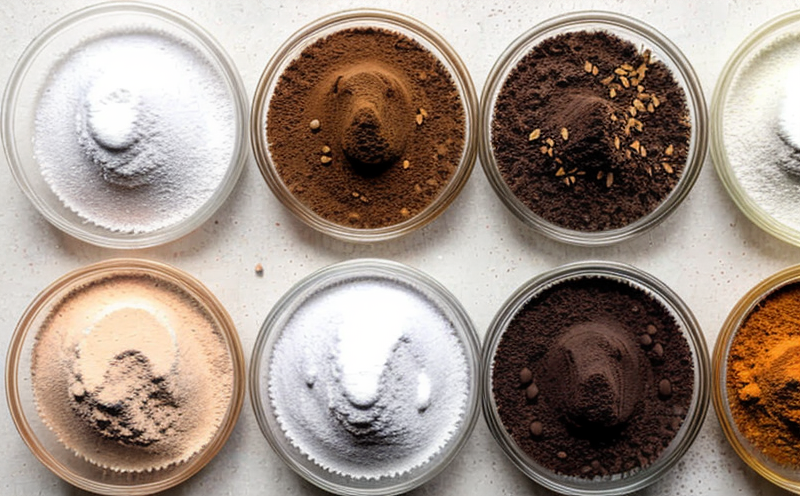ISO 37415 Anthocyanin Analysis in Berry Juices
ISO 37415 is a standardized method specifically designed to analyze anthocyanins in berry juices. This service is crucial for ensuring product quality, compliance with international standards, and meeting the stringent requirements of food safety regulations.
The analysis of anthocyanins is particularly important in the production of various fruit-based products such as jams, jellies, sauces, and beverages. Anthocyanins are natural pigments that contribute to the vibrant colors seen in many fruits and berries. Their presence can affect product appearance, flavor stability, and overall quality.
The ISO 37415 method employs spectrophotometry for quantification of anthocyanins. This technique is based on the principle of measuring absorbance at specific wavelengths that are characteristic of anthocyanin absorption. The process involves a series of steps to ensure accurate and precise results:
- Sample Preparation: Berry juices undergo filtration and dilution to ensure they meet the requirements for analysis.
- Standard Solutions: Calibration curves are created using known concentrations of anthocyanin standards.
- Spectrophotometric Analysis: Samples are analyzed in a spectrophotometer, which measures absorbance at 520 to 630 nm to determine the concentration of anthocyanins present.
- Data Interpretation: Results from the analysis are compared against the calibration curve to calculate the amount of anthocyanin present in the sample.
The accuracy and reliability of this method make it an essential tool for industries that produce or handle berry-based products. By adhering to ISO 37415, manufacturers can ensure consistent product quality and meet regulatory standards such as those set by the International Organization for Standardization.
Our laboratory utilizes advanced equipment including high-performance liquid chromatography (HPLC) and ultra-violet-visible spectrophotometers to perform this analysis. These tools provide precise results that are critical for maintaining product integrity.
The importance of accurate anthocyanin content measurement cannot be overstated, especially in the context of food and feed safety. Proper regulation and monitoring help ensure that products meet consumer expectations regarding flavor, color, and overall quality. This service plays a vital role in upholding these standards while providing data that is crucial for product development and market compliance.
Benefits
The benefits of using ISO 37415 for anthocyanin analysis in berry juices are numerous and far-reaching. Compliance with international standards ensures that products meet the highest quality benchmarks, enhancing consumer trust and satisfaction. By adhering to these guidelines, food producers can avoid potential legal issues and maintain a positive reputation.
From a technical standpoint, this service provides accurate quantification of anthocyanins in berry juices, which is essential for product development and formulation. It helps manufacturers optimize processes to ensure consistent color and flavor, leading to improved product quality and shelf life. This method also supports the research and development teams by providing precise data that can be used to innovate new products or improve existing ones.
Additionally, this service plays a crucial role in ensuring food safety. By accurately measuring anthocyanin content, potential contamination issues can be identified early, allowing for corrective actions to be taken promptly. This proactive approach not only protects the reputation of the company but also contributes to public health by preventing any adverse effects from contaminated products.
Moreover, ISO 37415 analysis supports sustainability efforts in the food industry. By ensuring consistent quality and safety, it helps reduce waste and improve resource efficiency throughout the production process. This, in turn, contributes positively to environmental conservation goals set forth by various regulatory bodies worldwide.
Environmental and Sustainability Contributions
- Reduction of Food Waste: Accurate measurement ensures that only high-quality products reach consumers, minimizing waste at every stage of the supply chain.
- Resource Efficiency: By optimizing production processes based on precise data from ISO 37415 analysis, resources such as water and energy are used more efficiently.
- Pollution Prevention: Ensuring product safety through this method helps prevent contamination incidents that could lead to environmental pollution.
The commitment to sustainability extends beyond just the production process; it encompasses the entire lifecycle of a product. By adhering to ISO 37415, companies demonstrate their dedication to responsible practices and contribute positively towards achieving global sustainability goals.
Use Cases and Application Examples
| Application | Description | Details |
|---|---|---|
| Fruit Juice Production | Ensuring consistent color and flavor in berry-based beverages. | Measure anthocyanin content to maintain product quality and comply with international standards. |
| Jam and Jelly Manufacturing | Avoiding off-color products that could lead to consumer dissatisfaction or waste. | Use ISO 37415 analysis to ensure the correct concentration of anthocyanins for vibrant color. |
| Berry Sauce Production | Maintaining consistent quality and flavor in sauces by monitoring anthocyanin levels. | Perform regular analyses to adjust production parameters as needed. |
| New Product Development | Developing innovative berry-based products with optimal color and flavor profiles. | Use this method during R&D phases to gather data that informs product design decisions. |
| Supply Chain Management | Ensuring consistency in product quality across different batches or suppliers. | Analyze incoming materials using ISO 37415 to verify they meet specified standards. |
| Quality Assurance and Control | Identifying variations in product characteristics that may affect consumer satisfaction. | Conduct periodic checks throughout the production process to maintain high standards. |
| Regulatory Compliance | Maintaining adherence to food safety regulations by ensuring accurate measurement of anthocyanins. | Promptly address any deviations from expected levels identified through ISO 37415 analysis. |
The versatility and applicability of ISO 37415 make it an indispensable tool for various sectors within the food industry. It supports not only quality assurance but also innovation, sustainability initiatives, and regulatory compliance across all stages of product development and production.





